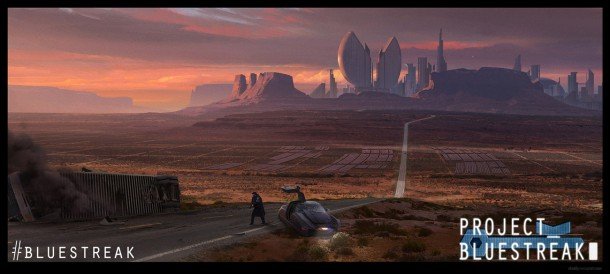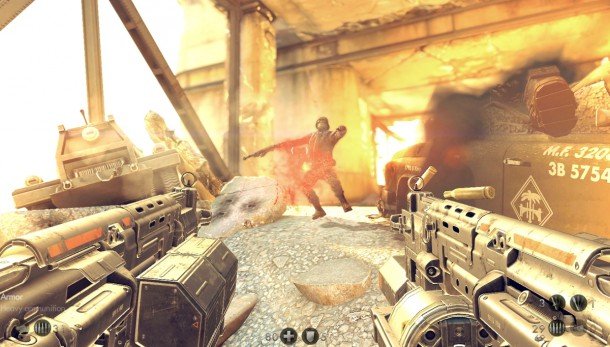Interview: Cliff Bleszinski on Project BlueStreak, PC gaming, FPS design, moddability

Earlier this month Cliff Bleszinski revealed his next project: a free-to-play, PC-focused arena shooter called Project BlueStreak created by Boss Key Productions, his new studio. Following a Reddit AMA that answered some surface-level questions about the game, I spoke with Bleszinski about what sort of shooter he's hoping to create.
PC Gamer: What's interesting to you about PC gaming right now?
Cliff Bleszinski: What's not? If you want the highest-end experience, you go to a high-end PC. If you want to go where the majority of the Twitch streams and the YouTubers are, it's mostly on PC. And not to flak the consoles, but for me, making a classic arena shooter that wants to have the maximum global reach possible and explore the free-to-play space, the PC absolutely makes the most sense, first and foremost.
Randy, over at Gearbox, he's doing that interesting looking pseudo-MOBA game Battleborn , and I looked at the platforms planned and it's PC, Xbox One, PlayStation 4, and a lot of developers intelligently do that to mitigate risk. And I get and respect that. But there's a little bit lost when you're not laser-focused on developing a project specifically for one platform initially to kind of maximize what that product is best at. And for PC, it's that classic keyboard-and-mouse aiming ability and the ability for players to maneuver in a nimble fashion on all axes.
PCG: How much of a priority is it to you that BlueStreak be a spectator-friendly experience?
Bleszinski: It all goes back to skill. When I watch the Dota championships—and I'm not a big MOBA guy, I play them enough to respect them—they're deep and they're complex. When I look at your average Call of Duty match it's “twitch to ironsights, pop-pop, randomly come around a corner…” that's fun as a core loop, but for me it doesn't have that first-person shooter dance , that Halo still nails, to be fair, where one person acquires another, starts opening up shots, and the other person has a shot at turning the table if they either find some health or a pickup or get lucky.
As long as a game is skill-based, and it yields those kinds of interesting “plays,” hopefully it'll wind up being watchable. But it comes down making a great, airtight game, and once those variables, those verbs are all in place and cool enough for the skilled players, that's when people want to watch it because it becomes aspirational.
Keep up to date with the most important stories and the best deals, as picked by the PC Gamer team.

PCG: In terms of achieving that “tightness” you're talking about, do you feel like a lot of it comes down to map design?
Bleszinski: There's a myriad of issues when it comes to map design in the single-player space and the multiplayer space in the shooter arena right now. And, you know, we were partially responsible for it in the Gears days… I always pull up that famous GIF where it's like “straight line, 90-degree turn, hallway, cutscene, hallway, cutscene,” as opposed to, you know, System Shock's map where it's like “Here you go, have fun, you might actually have to map this up.” Or Doom, E1M1 .
And what I think has happened in the single-player space is that it's gotten very linear, not allowing the player to just kind of explore on their own volition and get lost, which is part of the fun of a game. As well as in the multiplayer space, the multiplayer maps have become way too porous. And/or large. So we're at a point where if the map is too large, you walk out for 30 seconds trying to find some action and you get sniped from somebody you never saw. That is not fun. It's only completely fun for one person. And is that skill-based? No, it's not. That person just found the right grassy knoll to sit on and just pick people off. It's fun for him, it's not fun for anyone else who doesn't have a chance of getting back at him, right?
In the other multiplayer space, with the maps being too porous, it's literally… you come around a corner and you check one door, and there's two other doors where somebody comes through that you didn't check and they pop you because they saw you first. And that's very fun from a moment-to-moment kind of… “rat with a feeder pellet” type of gameplay, but it doesn't lend itself to the dance that I alluded to before, or very dramatic comebacks in an e-sports kind of space. So getting to a kind of medium-sized, arena-based shooter with the right balance of tight corners and open spaces is important to me. I think open spaces in a shooter like this… they're where that dance happens and they're also risky spaces to be in. But again, with map attractors like good weapons or power-ups, you have the tradeoff of risk to reward from that location's spaciousness as well as the desirability of the pickup.
PCG: When you talk about that dance, what do you expect your approach to player movement to be?
Bleszinski: When you look at movement in the majority of your average military shooters, you know, it's a contemporary world—and even, I think the people working on [Call of Duty] Advanced Warfare have realized how limiting that can be when you're just a regular soldier without any sort of boosters or speed-ups, jetpacks, things like that. And so what you have is run, prone, dash, maybe a dive, and just a jump. And that's fine for what that is, but there's so much more that can be done in sci-fi that can be done in regards to giving the player whatever movement we think is cool, we can come up with a creative fiction to explain how it's physically happening.
I don't want to spoil what I'm thinking of with this, but I think what I want to do on PC is get back to that sense of verticality that we weren't afraid of with a lot of the older shooters. Because on consoles we're always afraid of the twin sticks and looking up is too confusing if someone's above you—all that kind of stuff that Halo rightfully taught us—but leading with PC first, literally and figuratively with game mechanics.

PCG: What do you consider to be the best FPSs right now, and what do you like about them?
Bleszinski: What I liked about Titanfall was the variety of gameplay that, just when shooting by itself started to get a bit old, your Titan would be ready and they knew how to switch it up a bit. I think introducing a little bit of minion gameplay without Titanfall turning full MOBA was a good step for them. But outside of that, the new Wolfenstein was in my opinion, and I daresay this, one of the best first-person shooter campaigns since Half-Life 2. And I think I'm about halfway through right now, I'm stuck on this bridge section but I refuse to lower the difficulty because I hate having to do that in a game.
But when I saw that game at E3 a couple years ago and then PAX East, I was completely underwhelmed, I was writing it off. I didn't want to be a dick and say something about it on social, but my expectations were really low—I thought it seemed kind of cheesy and just weird. And then when I got hands-on, it was extraordinarily well written, graphically gorgeous, and the maps were extremely well built. And the combat was just fantastic, it was a labor of love.

Evan's a hardcore FPS enthusiast who joined PC Gamer in 2008. After an era spent publishing reviews, news, and cover features, he now oversees editorial operations for PC Gamer worldwide, including setting policy, training, and editing stories written by the wider team. His most-played FPSes are CS:GO, Team Fortress 2, Team Fortress Classic, Rainbow Six Siege, and Arma 2. His first multiplayer FPS was Quake 2, played on serial LAN in his uncle's basement, the ideal conditions for instilling a lifelong fondness for fragging. Evan also leads production of the PC Gaming Show, the annual E3 showcase event dedicated to PC gaming.

